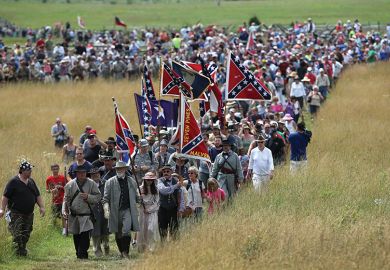I hate to think how many hours Asa Briggs spent delving in the vaults of the BBC to gather material for this book, but he seems to have relished the task. That is just as well, for it is a mammoth undertaking. Competition is the fifth volume of what is not in fact an official history of the BBC, but a piece of individual enterprise. All the more credit to Lord Briggs for his industry and dedication. But the finished product is an unusually weighty study (3lbs, on my scales), and it brings to mind the cautionary words of Bernard Levin when a similarly hefty work came his way - that any reader careless enough to drop it on his foot would never walk again.
So this long and heavy book is not suitable for reading in carpet slippers or for light relief. It is for serious students of broadcasting or, better still, those who have actually worked in the medium and can draw on personal recollections of the people involved. The cast list is wide-ranging. That tower of rectitude Lord Reith (slightly tilted, perhaps, by the revelations of his biographers) is assured of immortality by virtue of his role as BBC founder. But some of the others with a valid claim to a place in the pantheon are beginning to fade from memory. Do the names Haley, Jacob, Wheldon, Greene, Hill, Dimbleby (p re), Wyndham Goldie and Tahu Hole - just a random selection from the index - mean much to anyone under 30? I doubt it. Yet their pronouncements in the golden days of monopoly made the ground tremble, and the presence of some of them still broods over the BBC studio centres in Britain like the carved heads of Mount Rushmore in the United States. Briggs rattles their bones to good effect; they have an interesting story to tell.
At a cover price of £45, this book must be destined for the reference library shelf rather than the bedside table. Those who decide to lash out on a personal copy, however, and settle down to reading well over 1,000 close-packed pages, will ultimately find themselves in possession of enough information about the BBC between 1955 and 1974 to qualify for Mastermind. The author's practised hand gives the voluminous text a coherent shape, but it still serves as a reminder that large quantities of information are easier to assemble than to assimilate.
Broadcasting covers the whole span of human affairs, and a book dealing with the subject is bound to be in danger of over-running. Briggs leaves no corridor untrodden, no memo unturned. He draws not only on a vast archive of official papers and government reports, but on trolley-loads of star biographies, showbiz anecdotes, old press handouts, programme billings and gossipy titbits. They all add up to an unusual hybrid, part Hansard and part Radio Times.
The allocation of space is at times puzzling. Few would begrudge a page or two of history - perhaps five or six - to Doctor Who, but ten seems over the top (real Dalek fans, of course, may cry out for more). The opening lines of a seminal pop programme from the late 1950s, Six-Five Special, may well be worth preserving for their quaintness: "Hi there! Welcome aboard . . . We've got almost 100 cats jumping here, some real cool characters to give us the gas, so just get on with it and have a ball . . .'' But do people who did not accept invitations to appear really merit a mention? In Briggs's view, yes: "Refusals are as interesting to the historian as acceptances in broadcasting history.'' That helps to explain why so much of the book gets squeezed into footnotes in painfully small type.
Briggs has a sure touch when dealing with Westminster and Whitehall. This is useful, because mistrust of the BBC appears to be endemic in the political parties. Troubleshooters like Harman Grisewood, who managed to shed the bizarre title of director of the spoken word and become assistant to the director-general, were kept busy with everything from prime ministerial tantrums to complaints from Mary Whitehouse. In the case of Harold Wilson, the relationship with the BBC became, in the words of one distinguished commentator, "a sulphurous feud'', culminating in the spectacular row over yesterday's men. This set out to show what it was like to lose high office suddenly and unexpectedly, but Wilson and his ex-Cabinet colleagues, hyper-sensitive after their surprise 1970 general election defeat, were in no mood to take the satirical tone of the programme in good part. Injunctions were threatened, top-level warnings delivered, before the transmission went ahead. The fuss eventually died down, but the scars remain.
Harold Macmillan, in contrast, proved surprisingly untroubled at being regularly lampooned on the air. "I hope you will not, repeat not, take any action about That Was The Week That Was, he wrote to his postmaster-general, Reginald Bevins. "It is a good thing to be laughed over. It is better than to be ignored.'' His predecessor as prime minister, Anthony Eden, would not have been as sanguine in similar circumstances. He had become bitter over the BBC's handling of Suez, particularly the alleged lack of support in the government-financed overseas service. Those responsible for the service stood up for their right to exercise judgement - as one commented later: "What was lacking on the BBC's part was not an awareness of the Government's policies but a readiness to fall in with its wishes.'' The title of this book is aptly chosen. Competition for the BBC finally arrived with hurricane force soon after the Second World War, when the 1952 White Paper signalled the end of the BBC's monopoly and of the comfortable assumption that the licence fee (as gentlemanly a source of revenue as anyone could hope to have) was secure for all time. The BBC had to change, because ITV began to steal the national audience at a prodigious rate. In one week in 1957 the BBC's own figures showed that, in those parts of the country where viewers had a choice, ITV's share was 71 per cent against the BBC's 29 per cent. That trend could not be tolerated. The way the BBC fought back provides one of the book's most absorbing themes.
For some within the BBC, the main conflict was not with ITV but between radio and television. The old guard at Broadcasting House, with habits and loyalties dating back to the crystal set era, did not relish the prospect of sound radio being overwhelmed by the surging growth of television. The new generation of TV producers, however, were determined to secure what they considered a proper share of financial resources. Grace Wyndham Goldie, feisty godmother of some of the BBC's brightest young talents and a driving force in the development of television news and current affairs, made no secret of her belief that the arrival of ITV forced Broadcasting House to concede to television "a lot of powers, monies and other important things'' which would otherwise have continued to be denied in large measure.
While the BBC were having their problems, not all was plain sailing at ITV. Briggs reports the situation fairly. Airtime sales were desperately slow in materialising. The outlook was bleak and to those working in ITV at the time the BBC staff looked enviably secure. I remember being interviewed for a job at Granada Television shortly after the company went on the air in 1956 and bracing myself to ask its founders, Sidney and Cecil Bernstein, the question uppermost in my mind: "Are you sure you're going to be able to pay the salaries?'' They gave a bravely reassuring reply, but I learned later just how dangerous the situation had been.
A turning point for the BBC was the granting to it of a second channel. It followed the Pilkington committee inquiry, which gave the BBC a virtually clean bill of health and awarded nothing but black marks to ITV. The start of BBC2 gave a boost to morale and transformed audience prospects.
Pilkington was only one, but the most priggish and prejudiced, of the seemingly unending series of government inquiries which the broadcasting organisations have to endure to stay in business. Another, the Peacock Committee (too late for inclusion in this book) was responsible for the ludicrous idea of auctioning ITV contracts to the highest bidder, a recipe for disaster which ultimately provided vivid evidence of its ineptitude.
One of the problems of these committees is that most of their members know little about broadcasting and are ill-equipped for their task. Things have to be explained to them at length and in detail. This wastes many hours of broadcasters' time which could be better spent making programmes. Now there is an easy solution to the problem - read Briggs. Preferably all five volumes. Don Harker was until recently director of public affairs, Granada Television.
The History of Broadcasting in the United Kingdom: Volume Five, Competition
Author - Asa Briggs
ISBN - 0 19 215964 X
Publisher - Oxford University Press
Price - £45.00
Pages - 1160
Register to continue
Why register?
- Registration is free and only takes a moment
- Once registered, you can read 3 articles a month
- Sign up for our newsletter
Subscribe
Or subscribe for unlimited access to:
- Unlimited access to news, views, insights & reviews
- Digital editions
- Digital access to THE’s university and college rankings analysis
Already registered or a current subscriber? Login



